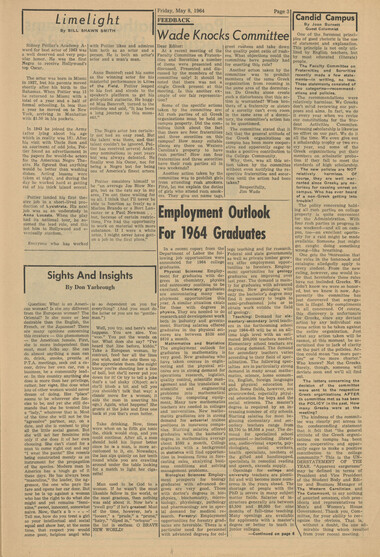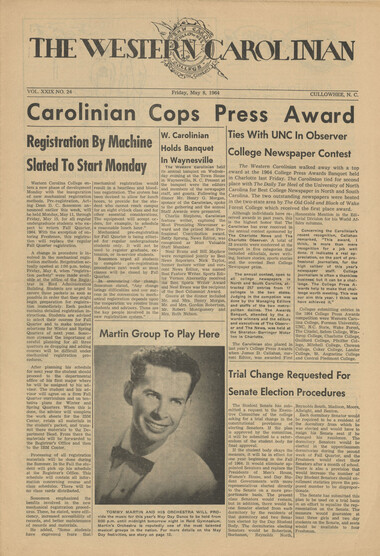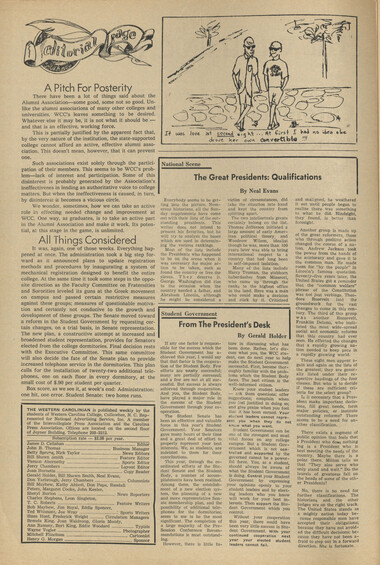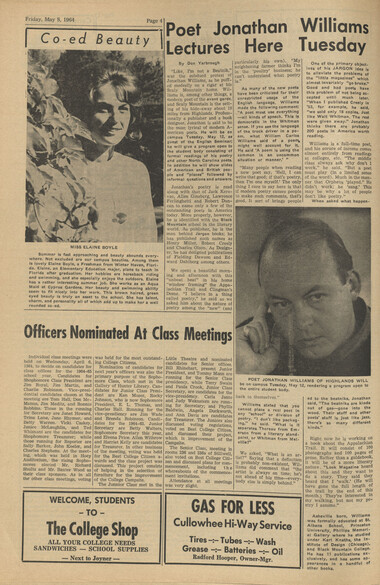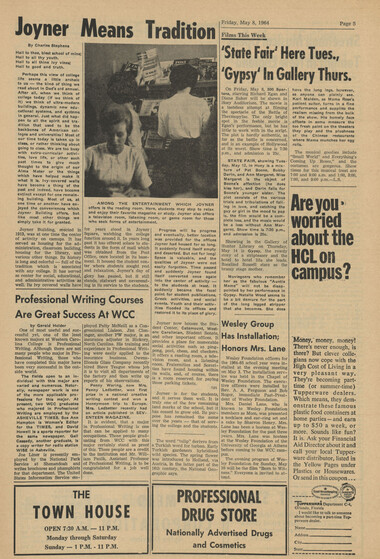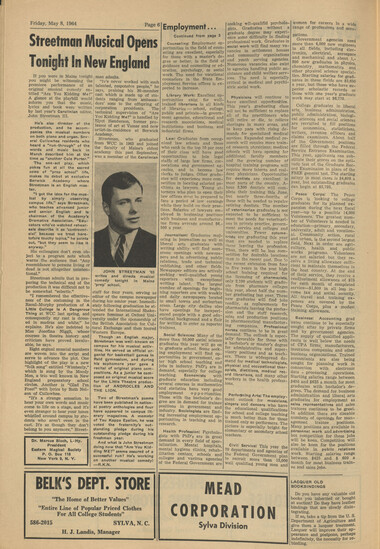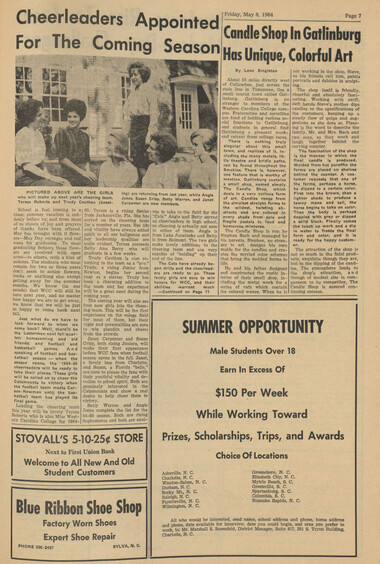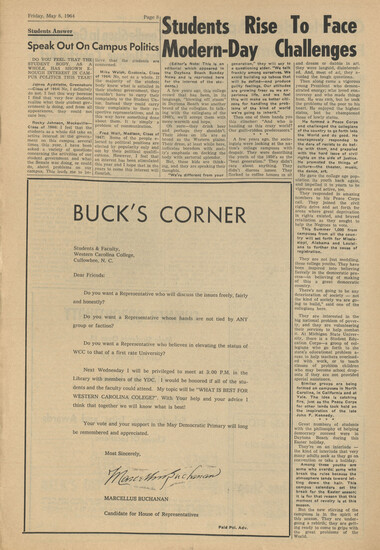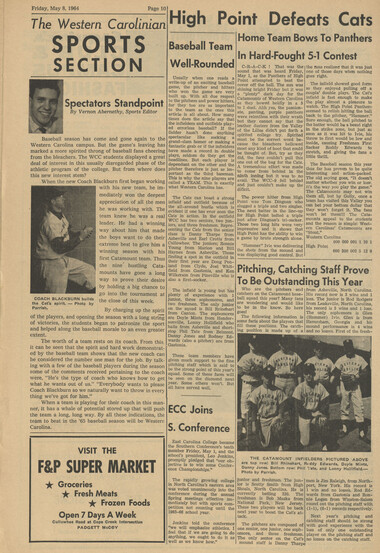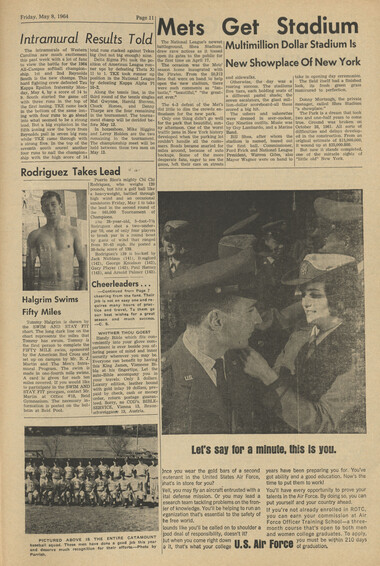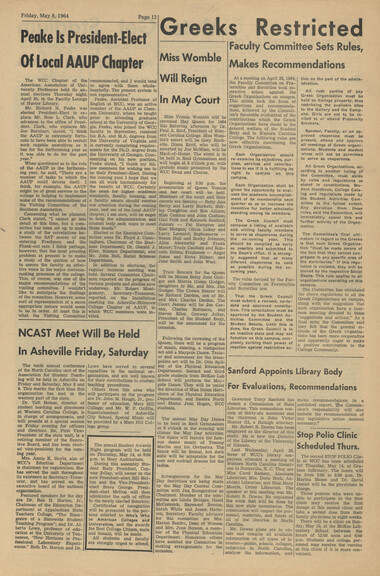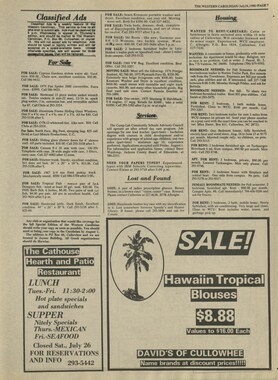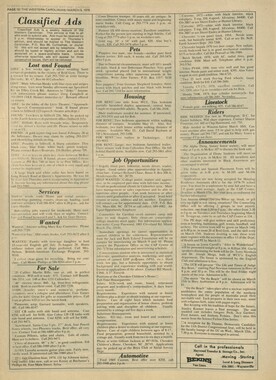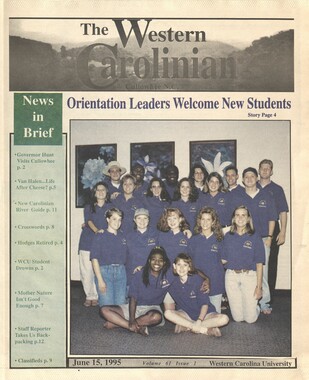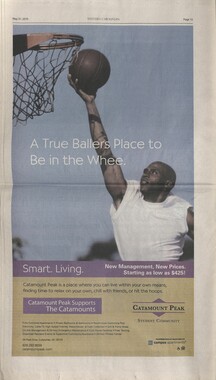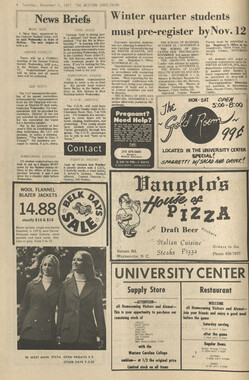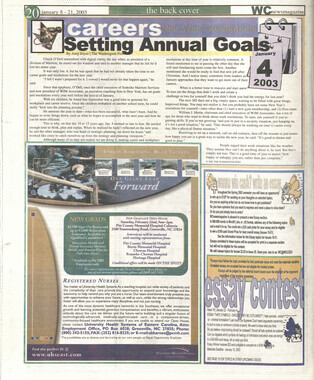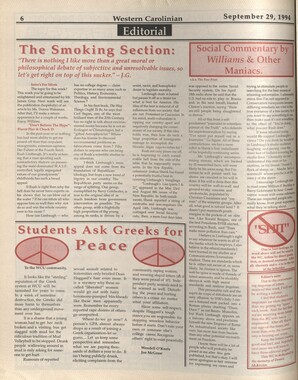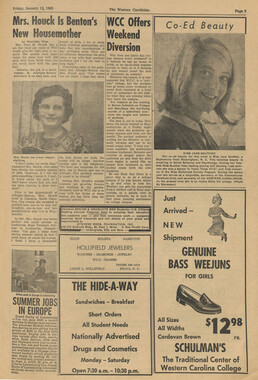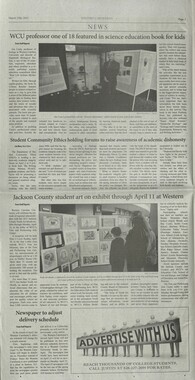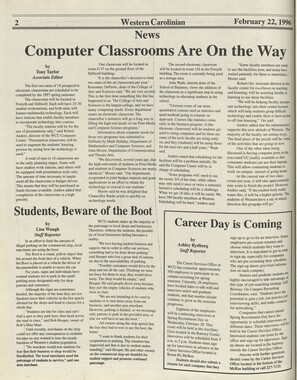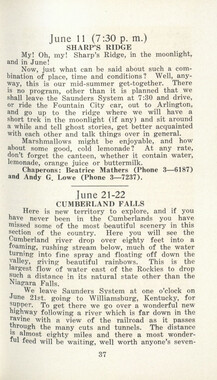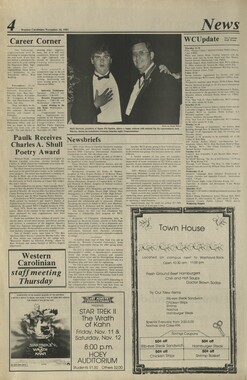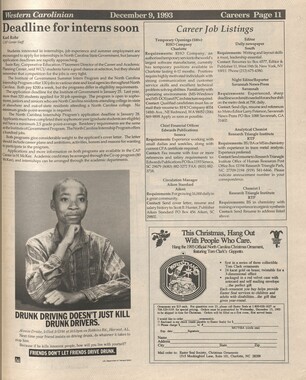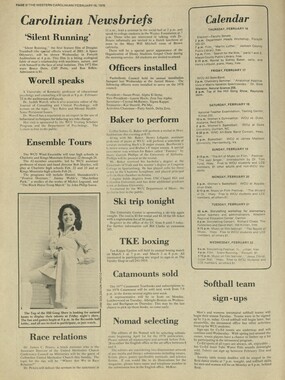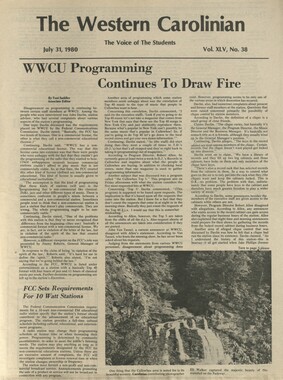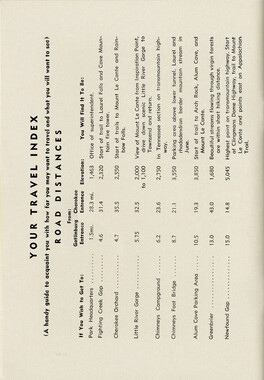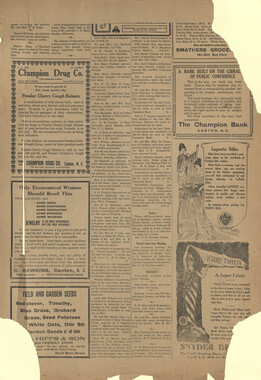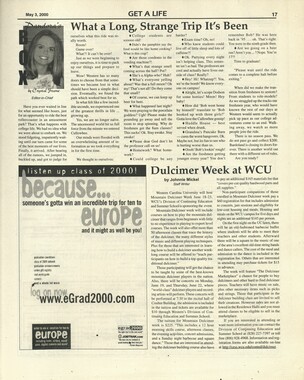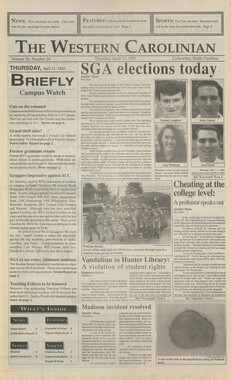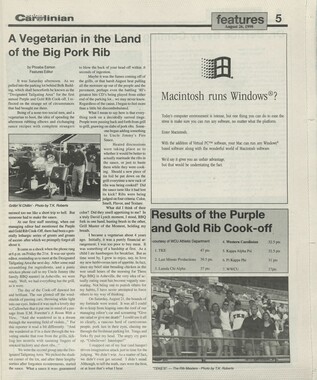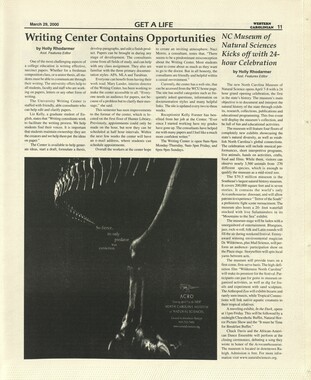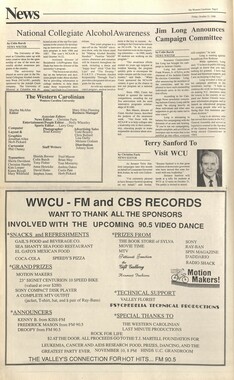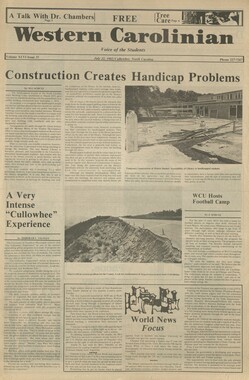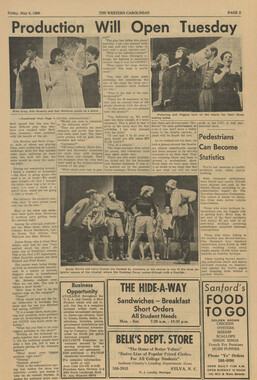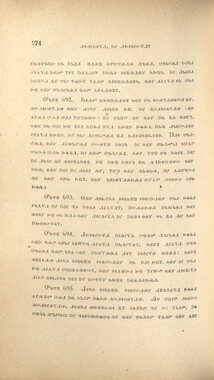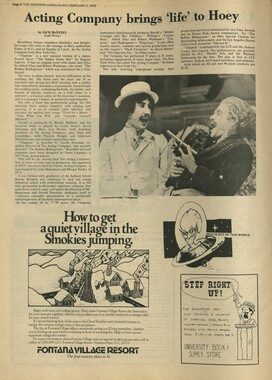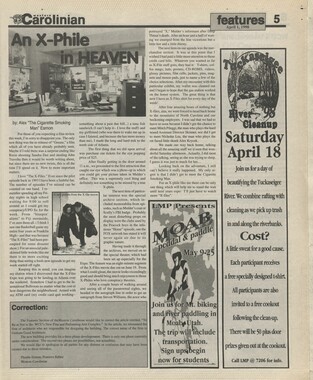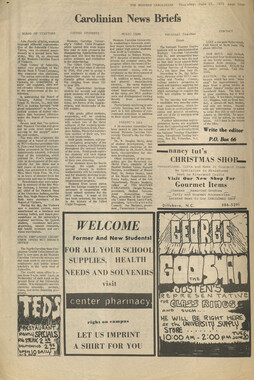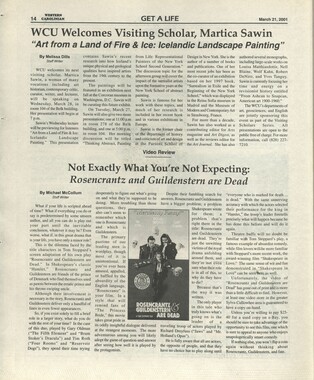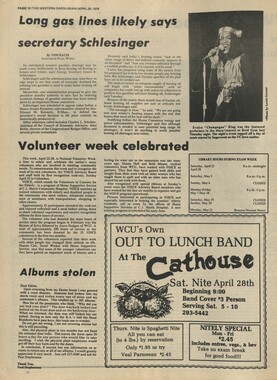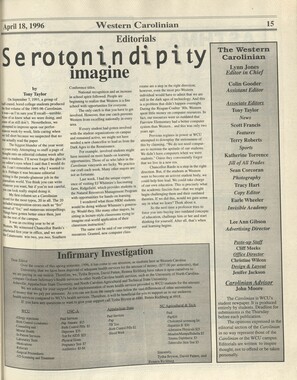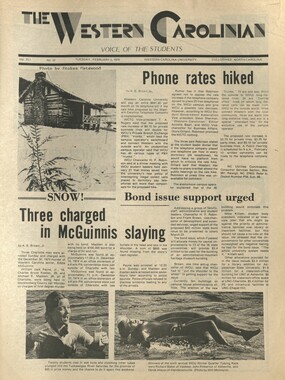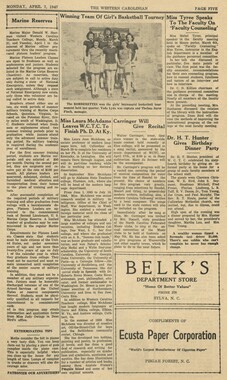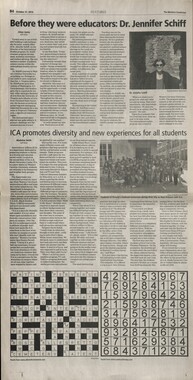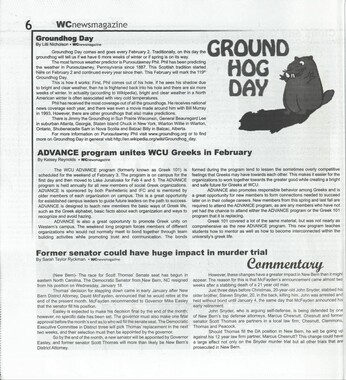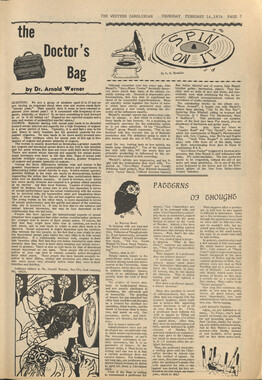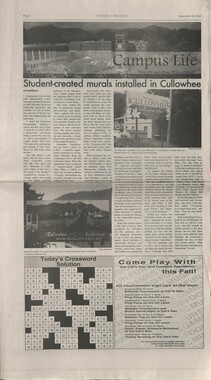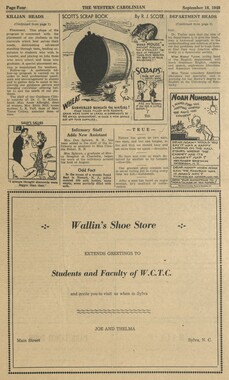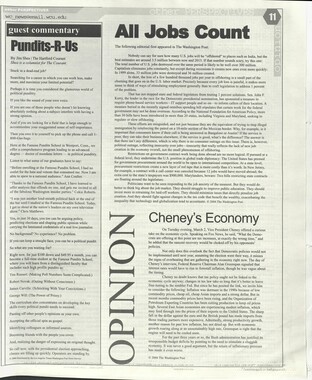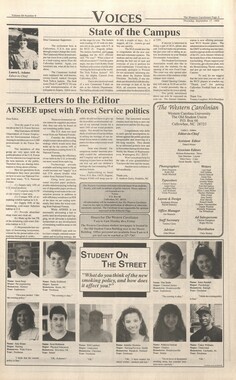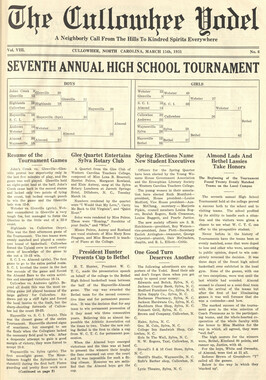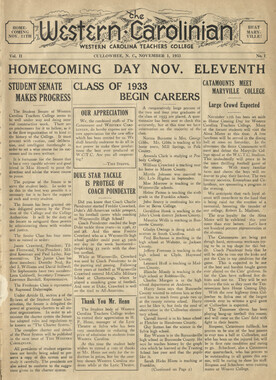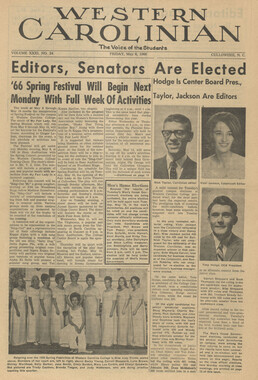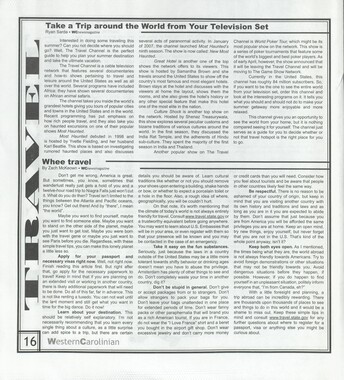Western Carolina University (21)
View all
- Canton Champion Fibre Company (2308)
- Cherokee Traditions (291)
- Civil War in Southern Appalachia (165)
- Craft Revival (1942)
- George Masa Collection (135)
- Great Smoky Mountains - A Park for America (2901)
- Highlights from Western Carolina University (422)
- Horace Kephart (941)
- Journeys Through Jackson (159)
- LGBTQIA+ Archive of Jackson County (85)
- Oral Histories of Western North Carolina (314)
- Picturing Appalachia (6798)
- Stories of Mountain Folk (413)
- Travel Western North Carolina (153)
- Western Carolina University Fine Art Museum Vitreograph Collection (129)
- Western Carolina University Herbarium (92)
- Western Carolina University: Making Memories (738)
- Western Carolina University Publications (2491)
- Western Carolina University Restricted Electronic Theses and Dissertations (146)
- Western North Carolina Regional Maps (71)
- World War II in Southern Appalachia (131)
University of North Carolina Asheville (6)
View all
- Allanstand Cottage Industries (62)
- Appalachian National Park Association (53)
- Bennett, Kelly, 1890-1974 (1463)
- Berry, Walter (76)
- Brasstown Carvers (40)
- Carver, George Washington, 1864?-1943 (26)
- Cathey, Joseph, 1803-1874 (1)
- Champion Fibre Company (233)
- Champion Paper and Fibre Company (297)
- Cherokee Indian Fair Association (16)
- Cherokee Language Program (22)
- Crowe, Amanda (40)
- Edmonston, Thomas Benton, 1842-1907 (7)
- Ensley, A. L. (Abraham Lincoln), 1865-1948 (275)
- Fromer, Irving Rhodes, 1913-1994 (70)
- George Butz (BFS 1907) (46)
- Goodrich, Frances Louisa (120)
- Grant, George Alexander, 1891-1964 (96)
- Heard, Marian Gladys (60)
- Kephart, Calvin, 1883-1969 (15)
- Kephart, Horace, 1862-1931 (313)
- Kephart, Laura, 1862-1954 (39)
- Laney, Gideon Thomas, 1889-1976 (439)
- Masa, George, 1881-1933 (61)
- McElhinney, William Julian, 1896-1953 (44)
- Niggli, Josephina, 1910-1983 (10)
- North Carolina Park Commission (105)
- Osborne, Kezia Stradley (9)
- Owens, Samuel Robert, 1918-1995 (11)
- Penland Weavers and Potters (36)
- Roberts, Vivienne (15)
- Roth, Albert, 1890-1974 (142)
- Schenck, Carl Alwin, 1868-1955 (1)
- Sherrill's Photography Studio (2565)
- Southern Highland Handicraft Guild (127)
- Southern Highlanders, Inc. (71)
- Stalcup, Jesse Bryson (46)
- Stearns, I. K. (213)
- Thompson, James Edward, 1880-1976 (226)
- United States. Indian Arts and Crafts Board (130)
- USFS (683)
- Vance, Zebulon Baird, 1830-1894 (1)
- Weaver, Zebulon, 1872-1948 (58)
- Western Carolina College (230)
- Western Carolina Teachers College (282)
- Western Carolina University (2008)
- Western Carolina University. Mountain Heritage Center (18)
- Whitman, Walt, 1819-1892 (10)
- Wilburn, Hiram Coleman, 1880-1967 (73)
- Williams, Isadora (3)
- Cain, Doreyl Ammons (0)
- Crittenden, Lorraine (0)
- Rhodes, Judy (0)
- Smith, Edward Clark (0)
- Appalachian Region, Southern (2693)
- Asheville (N.C.) (1936)
- Avery County (N.C.) (26)
- Blount County (Tenn.) (195)
- Buncombe County (N.C.) (1672)
- Cherokee County (N.C.) (283)
- Clay County (N.C.) (556)
- Graham County (N.C.) (236)
- Great Smoky Mountains National Park (N.C. and Tenn.) (519)
- Haywood County (N.C.) (3569)
- Henderson County (N.C.) (70)
- Jackson County (N.C.) (4913)
- Knox County (Tenn.) (35)
- Knoxville (Tenn.) (13)
- Lake Santeetlah (N.C.) (10)
- Macon County (N.C.) (420)
- Madison County (N.C.) (215)
- McDowell County (N.C.) (39)
- Mitchell County (N.C.) (132)
- Polk County (N.C.) (35)
- Qualla Boundary (982)
- Rutherford County (N.C.) (76)
- Swain County (N.C.) (2182)
- Transylvania County (N.C.) (270)
- Watauga County (N.C.) (12)
- Waynesville (N.C.) (86)
- Yancey County (N.C.) (72)
- Aerial Photographs (3)
- Aerial Views (60)
- Albums (books) (4)
- Articles (1)
- Artifacts (object Genre) (228)
- Bibliographies (1)
- Biography (general Genre) (2)
- Cards (information Artifacts) (38)
- Clippings (information Artifacts) (191)
- Copybooks (instructional Materials) (3)
- Crafts (art Genres) (622)
- Depictions (visual Works) (21)
- Design Drawings (1)
- Drawings (visual Works) (185)
- Envelopes (73)
- Exhibitions (events) (1)
- Facsimiles (reproductions) (1)
- Fiction (general Genre) (4)
- Financial Records (12)
- Fliers (printed Matter) (67)
- Glass Plate Negatives (381)
- Guidebooks (2)
- Internegatives (10)
- Interviews (815)
- Land Surveys (102)
- Letters (correspondence) (1013)
- Manuscripts (documents) (618)
- Maps (documents) (177)
- Memorandums (25)
- Minutes (administrative Records) (59)
- Negatives (photographs) (6090)
- Newsletters (1290)
- Newspapers (2)
- Notebooks (8)
- Occupation Currency (1)
- Paintings (visual Works) (1)
- Pen And Ink Drawings (1)
- Periodicals (193)
- Personal Narratives (10)
- Photographs (12976)
- Plans (maps) (1)
- Poetry (5)
- Portraits (4568)
- Postcards (329)
- Programs (documents) (181)
- Publications (documents) (2443)
- Questionnaires (65)
- Relief Prints (26)
- Sayings (literary Genre) (1)
- Scrapbooks (282)
- Sheet Music (2)
- Slides (photographs) (402)
- Songs (musical Compositions) (2)
- Sound Recordings (796)
- Specimens (92)
- Speeches (documents) (18)
- Tintypes (photographs) (8)
- Transcripts (322)
- Video Recordings (physical Artifacts) (23)
- Text Messages (0)
- A.L. Ensley Collection (275)
- Appalachian Industrial School Records (7)
- Appalachian National Park Association Records (336)
- Axley-Meroney Collection (2)
- Bayard Wootten Photograph Collection (20)
- Bethel Rural Community Organization Collection (7)
- Blumer Collection (5)
- C.W. Slagle Collection (20)
- Canton Area Historical Museum (2110)
- Carlos C. Campbell Collection (462)
- Cataloochee History Project (64)
- Cherokee Studies Collection (4)
- Daisy Dame Photograph Album (5)
- Daniel Boone VI Collection (1)
- Doris Ulmann Photograph Collection (112)
- Elizabeth H. Lasley Collection (1)
- Elizabeth Woolworth Szold Fleharty Collection (4)
- Frank Fry Collection (95)
- George Masa Collection (173)
- Gideon Laney Collection (452)
- Hazel Scarborough Collection (2)
- Hiram C. Wilburn Papers (28)
- Historic Photographs Collection (236)
- Horace Kephart Collection (861)
- Humbard Collection (33)
- Hunter and Weaver Families Collection (1)
- I. D. Blumenthal Collection (4)
- Isadora Williams Collection (4)
- Jesse Bryson Stalcup Collection (47)
- Jim Thompson Collection (224)
- John B. Battle Collection (7)
- John C. Campbell Folk School Records (80)
- John Parris Collection (6)
- Judaculla Rock project (2)
- Kelly Bennett Collection (1482)
- Love Family Papers (11)
- Major Wiley Parris Civil War Letters (3)
- Map Collection (12)
- McFee-Misemer Civil War Letters (34)
- Mountain Heritage Center Collection (4)
- Norburn - Robertson - Thomson Families Collection (44)
- Pauline Hood Collection (7)
- Pre-Guild Collection (2)
- Qualla Arts and Crafts Mutual Collection (12)
- R.A. Romanes Collection (681)
- Rosser H. Taylor Collection (1)
- Samuel Robert Owens Collection (94)
- Sara Madison Collection (144)
- Sherrill Studio Photo Collection (2558)
- Smoky Mountains Hiking Club Collection (616)
- Stories of Mountain Folk - Radio Programs (374)
- The Reporter, Western Carolina University (510)
- Venoy and Elizabeth Reed Collection (16)
- WCU Gender and Sexuality Oral History Project (32)
- WCU Mountain Heritage Center Oral Histories (25)
- WCU Oral History Collection - Mountain People, Mountain Lives (71)
- WCU Students Newspapers Collection (1923)
- Western North Carolina Tomorrow Black Oral History Project (69)
- William Williams Stringfield Collection (2)
- Zebulon Weaver Collection (109)
- African Americans (390)
- Appalachian Trail (35)
- Artisans (521)
- Cherokee art (84)
- Cherokee artists -- North Carolina (10)
- Cherokee language (21)
- Cherokee pottery (101)
- Cherokee women (208)
- Church buildings (190)
- Civilian Conservation Corps (U.S.) (111)
- College student newspapers and periodicals (2012)
- Dams (107)
- Dance (1023)
- Education (222)
- Floods (61)
- Folk music (1015)
- Forced removal, 1813-1903 (2)
- Forest conservation (220)
- Forests and forestry (1195)
- Gender nonconformity (4)
- Great Smoky Mountains National Park (N.C. and Tenn.) (181)
- Hunting (45)
- Landscape photography (25)
- Logging (119)
- Maps (83)
- Mines and mineral resources (8)
- North Carolina -- Maps (18)
- Paper industry (38)
- Postcards (255)
- Pottery (135)
- Railroad trains (72)
- Rural electrification -- North Carolina, Western (3)
- School integration -- Southern States (2)
- Segregation -- North Carolina, Western (5)
- Slavery (5)
- Sports (452)
- Storytelling (243)
- Waterfalls -- Great Smoky Mountains (N.C. and Tenn.) (66)
- Weaving -- Appalachian Region, Southern (280)
- Wood-carving -- Appalachian Region, Southern (328)
- World War, 1939-1945 (173)
Western Carolinian Volume 29 Number 24
Item
Item’s are ‘child’ level descriptions to ‘parent’ objects, (e.g. one page of a whole book).
-
-
Limelight By BILL SHAWN SMITH Sidney Poitier's Academy A- ward for best actor of 1963 was a well deserved and very popular honor. He was the first Negro to receive Hollywood's top Oscar. The actor was born in Miami in 1927, but his parents moved shortly after his birth to the Bahamas. When Poitier was 15 he returned to Miami with a total of a year and a half of formal schooling. In less than a year he moved on to New York, arriving in Manhattan with $1.50 in his pockets. In 1943 he joined the Army (after lying about his age which in reality was 16). After his visit with Uncle Sam and an asortment of odd jobs, Poitier found an advertisement in the papers for would-be actors for the American Negro Theatre. He figured that anything would be better than washing dishes. Acting lessons were taken at night, and during the day he worked hard at getting rid of his thick island accent. Poitier landed his first theatre job in a short-lived production of Lysistrata. His next job was as an understudy in Anna Lucasta. When the play had its national tour, he assumed the lead role, and this led him to Hollywood and e- vcntually stardom. Everyone who has worked with Poitier likes and admires him both as an actor and a person. He is both an actor's actor and a man's man. Friday, May 8, 1964 Page 3 FEEDBACK Wade Knocks Committee Dear Editor: At a recent meeting of the Faculty Committee on Fraternities and Sororities a number of items were presented and discussed. Presented and discussed by the members of the committee only! It should be noted that there was not a single Greek present at this meeting. Is this another example of our fair representation? Some of the specific actions taken by the committee are: All rush parties of all Greek organizations must be held on campus property. Did the com mittee think about the fact that there are four fraternities and three sororities on this campus? How many suitable places are there on Western Carolina's property to have rush parties? How can four fraternities and three sororities have their rush parties all in two weekends? Another action taken by the committee was to prohibit girls from attending rush smokers. be "an average Joe Blow Ne- I First, let me explain the duties Anne Bancroft read his name as the winning actor for his masterful performance in Lilies of the Field. Poitier leaped to his feet and strode to the speaker's platform to get his gold-plated statuette. He hugged Miss Bancroft, turned to the audience and said, "It has been a long journey to this moment." The Negro actor has certainly not had an easy road. But the talent was there, and that talent couldn't be ignored. Poitier has received several Academy nominations in past years but was always defeated. He finally won his Oscar, not for being a Negro but for being one of America's finest actors. Poitier considers himself to gro, but as the cats say in my area, I'm out there wailing for us all. I think that I'll never be able to function as freely as a Marlon Brando or a Burt Lancaster or a Paul Newman . . . but, because of certain restrictions, I've had the opportunity to work on material with more substance. If I were a white actor, I might never have gotten a job in the first place." of girls who attend rush smokers. They give out name tags, greet rushees and take down the quality point ratio of rushees. What objections could the committee have possibly had for enacting this rule? Another action taken by the committee was to prohibit members of the same Greek organization from rooming in the same area of the dormitories. Do Greeks alone create such a disturbance that this action is warranted? When brothers of a fraternity or sisters of a sorority can't even room in the same area of a dormitory, the committee's action has to be questioned. The committee stated that it felt that the general attitude of the Greek organizations on campus has been more cooperative and apparently eager to make a positive contribution to the College Community. Why, then, was all this action taken by the committee without even notifying the respective fraternities and sororities until the action had been taken? Respectfully, Jim Wade Employment Outlook For 1964 Graduates Sights And Insights By Don Yarbrough Question: What is an American woman? Is she any different from the European woman? The Oriental? Is she more or less desirable than the English, the French, or the Japanese? There are many opinions concerning this creature — this phenomenon — the American female. First, she is more independent than most, most folks say. She can do almost anything a man can do, drink, smoke, preside at P.T.A. meetings, seek out a career, drive her own car, run a business, be a community leader. In this country anything she does is more than her privilege, rather, her right. She does what lots of other women would never dream of doing. Her "place" seems to be wherever she fancies to be, and yet she still demands that she be treated like a "lady," whatever that is. Most of the time she will not be the "agressive" partner, say, on a date, and she is content to play all the little social games. But she will act her feminine role only if she does it of her own choosing. She can't stand for a man to come right out and say "I wear the pants!" She resents being constructed merely as an instrument for the propagation of the species. Modern man in America has a tough go of it these days. He has always been "masculine," the leader, the aggressor, the one who pays the fare and opens her car door. But now he is up against a woman who has the right to do what she might and yet remains "feminine," sweet, innocent, somewhat naive. Now, that's a b — - -! Tell me, how do you treat a girl as your intellectual and social equal and show her, at the same time, that respect you would some poor, helpless angel who is so dependent on you for everything? (And you must do the latter or you are no "gentleman.") Well, you try, and here's what happens. You are nice. You "woo." You put the words on her. What does she say? "I've heard that line before, kiddo." Take a European woman, by contrast, feed her all the lines you wish, and she eats them up. She appreciates them. She might know you're shooting her a line of bull, but she'll never put you down for it! Or try to tell a joke that's a tad shaky (Object: so's she'll blush a bit and tell you you shouldn't talk that way: a classic move for a woman; it aids the man in asserting his ego.) Again, what happens? She grunts at the joke and fires one back at you that's even hotter. Take drinking. Now, times were when on te fifth gin tonic the. chick would stop, and you could continue. After all, a man should hold his liquor better since he is a man, is more accustomed to it, etc. Nowadays, the lass sips quietly on her tenth round while you are crawling around under the table looking for a match to light her cigarette! Man used to be God to a woman. If he wasn't the most likeable fellow in the world, or the most gracious, then nothing was said about it. Now he's a "swell guy" if he's greatest! Most of the time, however, he's a "looser," a "prude," a "prune,' "hairy," "diped in," "octopus" — the list is endless. O BRAVE NEW WORLD! In a recent report from the Department of Labor the following job opportunities were announced for 1964 college graduates. Physical Sciences: Employment for graduates with degrees in chemistry, physics and astronomy continue to be excellent. Chemistry graduates are encountering many em ployment opportunities this year. A similar situation exists for those with degrees in physics. They are needed to do research and development work both in industry and government. Starting salaries offered graduates in the physical sciences are between $520 and $610 a month. Mathematics and Statistics: The employment outlook for graduates in mathematics is very good. New graduates who have taken courses in engineering and the physical sciences are in strong demand for operations research, logistics quality control, scientific management and the translation of scientific and engineering problems into mathematical terms for computing equipment. Many new mathematics teachers are needed in colleges and universities. New mathematics graduates are in strong demand for actuarial trainee positions in insurance companies. Starting salaries offered graduates with the bachelor's degree in mathematics average about $580 a month. College graduates with a background in statistics will find opportunities in business firms in forecasting sales, analyzing business conditions and solving management problems. Biological Sciences: Employment prospects for biology graduates with advanced degrees are very good. Those with doctor's degrees in bio physics, biochemistry, microbiology, physiology, pathology and pharmacology are in special demand for medical research. Forestry: Employment opportunities for forestry graduates are favorable. There is a particular need for personnel with advanced degrees for col lege teaching and for research. Federal and state governments as well as private timber growers offer employment opportunities to foresters. Employment oportunities for geology graduates are improved over last year. The demand is main ly for graduates with advanced degrees. New geologists with only the bachelor's degree may find it necessary to begin in semi-professional jobs or to obtain work outside the field of geology. Teaching: Demand for elementary-secondary level teachers in the forthcoming school year 1964-65 will be at an all- time high level with an estimated 200,000 teachers needed. Elementary school teachers are in strong demand. The demand for secondary teachers varies according to their field of specialization. The following specialties are in particularly strong demand in many areas: mathematics, science, home economics, English, foreign languages and physical education for girls. Some fields, however, are overcrowded, especially physical education for boys and the social sciences. The master's degree is required by an increasing number of city schools. Starting salaries for most beginning elementary and secondary teachers range from $3,750 to $6,500 a year. The demand for specialized school personnel — including librarians, audio-visual experts, psychologists, social workers, health specialists, teachers of the gifted and handicapped, specialists in remedial reading and speech, exceeds supply. Openings for college and university teachers are plentiful and will become more numerous in the years ahead. The shortage of people with the PhD is severe in many subject matter fields. Salaries of instructors generally are between $5,500 and $6,000 for nine months of full-time teaching. Many openings are available for applicants with a master's degree or better to teach in junior colleges. —Continued on page 6 Candid Campus By Joan Burnett Guest Columnist One of the foremost principles of good rhetoric is the use of statement and explanation. This principle is not only utilized by English teachers, but by most educated (literate) people. The Faculty Committee on Fraternities and Sororities recently made a few statements—in writing, no less. These statements consisted of two categories—recommendations and policies. The recommendations were relatively harmless. We Greeks don't mirid reviewing our purposes and aims. In fact, we do it every year when we revise our constitutions for the Student Activities Commitee. Stressing seholarship is likewise no effort on our part. We do it all the time. We even give out a scholarship trophy or two every year, and some of the Greek organizations put their members on scholastic probation if they fail to meet the standards of high scholarship. The new policies are NOT relatively harmless. Of course, they are well warranted since Greeks are notorious for causing unrest on campus. Who has ever heard of a non-Greek getting Into trouble? The policy concerning holding all rush parties on college property is quite convenient for the Administration. With four rush parties in progress in one weekend—and all on campus, too—an excellent oportu- nity for a raid might be made available. Someone just might get caught doing something wrong—like breathing. One gets the impression that the rules in the hanaoook and catalogue alledgedly apply to every student. From the new ruling, however, one would infer that heretofore these rules have not included Greeks. We didn't know we were so honored, but we know it now. Apparently the committee has just discovered that segregation is illegal. My compliments to all concerned. Of course, this discovery is unfortunate for Greeks, since any deviant action by any individual can cause action to be taken against the entire organization. Just what any action taken will be cannot, at this moment, be ascertained due to lack of clarity on the part of the policies. Action could mean "no more parties" or "no more charter." Who knows? Not the Greeks. Surely, though, someone will deviate soon and we'll all find out. The letters concerning the decision of the committee were sent to the respective Greek organizations AFTER th committee met as has been the POLICY in the past. How many Greeks were at the meeting? The kindness of the committee was clearly put across in the condescending statement that it felt that "the general attitude of the Greek organizations on campus has been more cooperative and apparently eager to make a positive contribution to the college community." This is the UNDERSTATEMENT OF THE YEAR. "Apparent eargerness" may be defined in terms of President and Vice President of the Student Body and Editor and Business Manager of The Western Carolinian and The Catamount, to say nothing of assorted senators, club presidents and reprecentatives to Men's and Women's House Government. Thank you. Committee, for your ability to recognize the obvious. That is, without a doubt, the one admirable thing which resulted from your recent meeting. V
Object
Object’s are ‘parent’ level descriptions to ‘children’ items, (e.g. a book with pages).
-
The Western Carolinian is Western Carolina University’s student-run newspaper. The paper was published as the Cullowhee Yodel from 1924 to 1931 before changing its name to The Western Carolinian in 1933.
-
